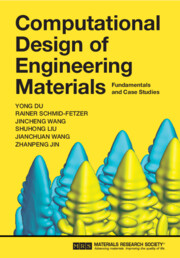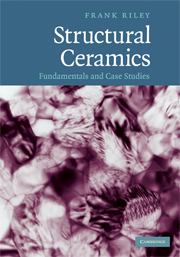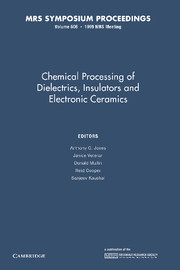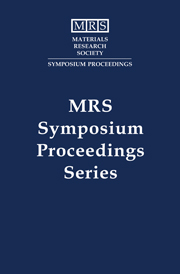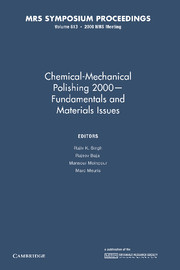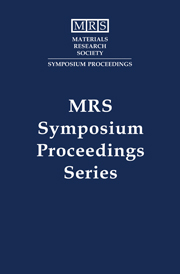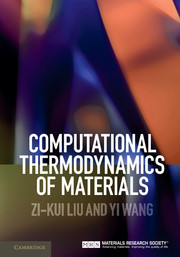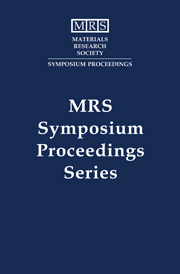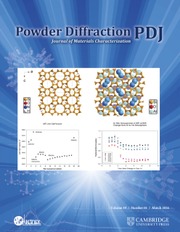Computational Design of Engineering Materials
Fundamentals and Case Studies
- Authors:
- Yong Du, Central South University, China
- Rainer Schmid-Fetzer, Clausthal University of Technology, Germany
- Jincheng Wang, Northwestern Polytechnical University, China
- Shuhong Liu, Central South University, China
- Jianchuan Wang, Central South University, China
- Zhanpeng Jin, Central South University, China
- Date Published: June 2023
- availability: Available
- format: Hardback
- isbn: 9781108494106
Hardback
Other available formats:
eBook
Looking for an inspection copy?
This title is not currently available on inspection.
-
Introducing state-of-the art computational methods, this book combines detailed explanations with real-world case studies to give a full grounding in the design of engineering materials. This book presents a wide spectrum of key computational methods, such as CALPHAD-method, first-principles calculations, phase-field simulation and finite element analysis, covering the atomic-meso-macro scale range. The reader will see these methods applied to case studies for steel, light alloys, superalloys, cemented carbides, hard coating and energy materials, demonstrating in detail how real-world materials are designed. Online ancillary material includes input files for computational design software, providing the reader with hands-on design experience. Step-by-step instructions will allow you to perform and repeat the simulations discussed in the book. Aimed at both graduate and undergraduate students as well as non-specialist researchers in materials science and engineering, including ceramics, metallurgy, and chemistry, this is an ideal introductory and reference book.
Read more- Presents state-of-the-art computational methods, using a multi-scale approach
- Includes detailed demonstrations on a variety of real-world case studies
- Features online ancillary with step-by-step instructions, to provide hands-on experience
Reviews & endorsements
'Computational Design of Engineering Materials - an ambitious title for an ambitious book! But the authors match that expectation! They carefully explain atomistic models like density functional theory and molecular dynamics simulations before going to mesoscale approaches like cellular automaton, the CALPHAD, multi-phase-field and the phase-field-crystal methods. This fundamental part of the book is complemented by several chapters addressing case studies. They are selected from different materials like steels, Al- and Mg-alloys and superalloys and also from examples of different applications like hard coatings or energy materials. The book concludes with a section on future development focusing on ICME (Integrated Computational Materials Engineering) and MGI (Materials Genome Initiative). A 'must have' for students and engineer of the material community.' Georg J. Schmitz, Access e.V
Customer reviews
Not yet reviewed
Be the first to review
Review was not posted due to profanity
×Product details
- Date Published: June 2023
- format: Hardback
- isbn: 9781108494106
- length: 420 pages
- dimensions: 251 x 176 x 28 mm
- weight: 1.18kg
- availability: Available
Table of Contents
1. Introduction
2. Fundamentals of atomistic simulation methods
3. Fundamentals of mesoscale simulation methods
4. Fundamentals of crystal plasticity finite element method
5. Fundamentals of computational thermodynamics and the CALPHAD method
6. Fundamentals of thermophysical properties
7. Case studies on steel design
8. Case studies on light alloy design
9. Case studies on superalloy design
10. Case studies on cemented carbide design
11. Case studies on hard coating design
12. Case studies on energy materials design
13. Summary and future development of materials design
Appendix A
Appendix B
Appendix C.
Sorry, this resource is locked
Please register or sign in to request access. If you are having problems accessing these resources please email [email protected]
Register Sign in» Proceed
You are now leaving the Cambridge University Press website. Your eBook purchase and download will be completed by our partner www.ebooks.com. Please see the permission section of the www.ebooks.com catalogue page for details of the print & copy limits on our eBooks.
Continue ×Are you sure you want to delete your account?
This cannot be undone.
Thank you for your feedback which will help us improve our service.
If you requested a response, we will make sure to get back to you shortly.
×
